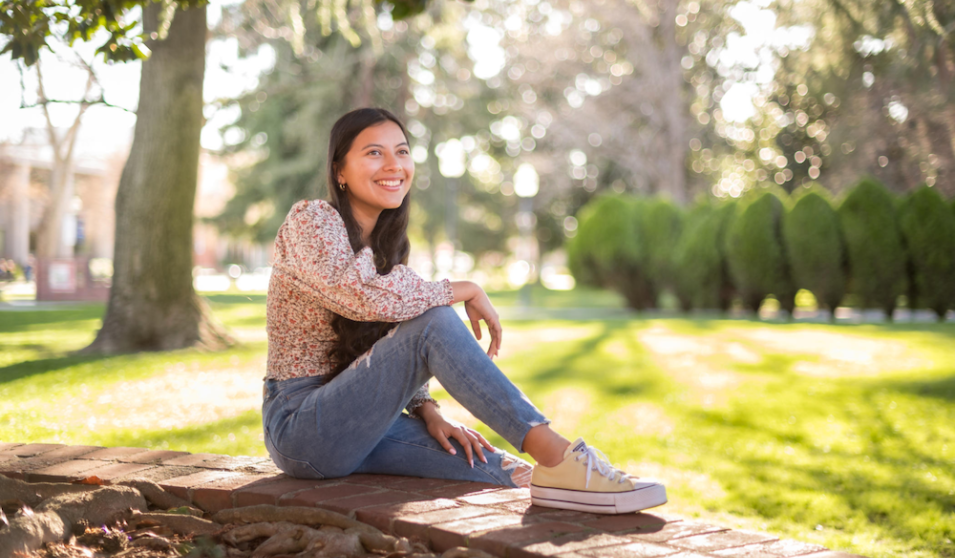The following article about the Giving Back Home program was originally published by our partners at Chico State. We are so thankful to have partners dedicated to encouraging young people to contribute back to their rural communities! Chico State serves as the anchor for our Northern California Regional Hub. You can view the original article here.
Growing up, Yarely Contreras was her parents’ trusted translator and guide as they navigated everything from medical appointments to school meetings.
The experience highlighted for her the hurdles immigrants and families who speak languages other than English face when they seek and obtain services. It also serves as her catalyst to seek out ways to improve the system.
Contreras is among the Chico State students who have participated in Giving Back Home, a program that creates a support system for students who want to contribute to the vitality of their hometowns while attending Chico State.
As the daughter of two Mexican immigrants and the older sister of someone with special needs, Contreras (Liberal Studies, ’25) focused her project on access to education and information for underrepresented populations and individuals with learning disabilities. She led presentations to 50 future educators and shared her family’s challenges with the educational system, including the lack of transparency, trust, and support. Contreras also provided recommendations on how teachers can better serve students like her sister.
“I hope to act as a voice for those of us who are often overlooked in the educational system,” Contreras said.
Director of Civic Engagement Ann Schulte said Giving Back Home is an opportunity for students to elevate their voices and engage in their home community.
Students are experts on their hometowns, she said. The program gives faculty an outlet to help connect curriculum in relevant ways—students can take what they are learning at Chico State to their community.
The program, which Schulte designed, also helps strengthen the University’s relationships with small communities, particularly rural counties in the North State, she said.
For Schulte, the first activity that drove this idea home for her was a project led by art student Ryan Ramos in 2018. The Corning native was a student in J. Pouwels’ “Public Art” course when students were looking to partner with a public library on a proposal for a mural. Ramos’ suggestion of painting of a Latino olive picker to recognize the contributions of farmworkers in Corning was accepted and later approved by the Corning City Council.
“He now has this image in his home community that he and his classmates painted,” she said.
Giving Back Home aims to go beyond volunteering at a food bank, although that can also be a project. Students can volunteer to organize and produce meaningful social change, participate in community-wide initiatives, lend their perspectives or expertise to a committee, or raise awareness about helpful programs or services. Some Chico State students have returned to their high schools to share advice and resources about going to college or securing financial aid.
“A civic contribution means using your time, skills, and assets to help improve the community,” according to the program website.
Contreras decided to participate in the Giving Back Home project to challenge herself and grow her public speaking skills. In brainstorming with Schulte, the two made the connection between Contreras’ life and education.
“I was able to share my perspective with aspiring educators, so they have knowledge on the subject,” she said. “I know a lot of families who have kids with disabilities need someone in the middle to advocate for them—there are a lot of communications that happen—and I shared how educators can build trust and how to better communicate with families, particularly from different cultures.
“It was nice to get out there and share my experience.”
Kendall Leon, who taught “Academic Writing” in fall 2022, integrated Giving Back Home as part of two classes last semester and had 55 students opt to participate.
She said she would typically incorporate community engagement in her classes as “it is a high-impact practice that promotes student success.” And after speaking with Schulte, Leon knew she wanted to make Giving Back Home an option for her students as it focused on connecting students to their hometowns and allowing them to contribute in meaningful ways.
“I also saw this as an opportunity to help facilitate the transition between high school and college,” Leon said.
Her students’ projects varied widely. One student passionate about surfing participated in a beach cleanup, while another created a sharable map that detailed sustainable places to shop in Chico. Other student projects focused on water usage rights, fentanyl awareness, humane meat-handling techniques, and art therapy for mental health.
“Giving space for students to learn about and share what matters to them facilitates learning and encourages students to own their education and see that they have something to contribute,” Leon said. “It was amazing to get to know the students better because of their personal interests and passions.”
To participate, students must complete two CAVE Community Engagement workshops and a civic contribution in their home community and submit a written or video reflection to the Office of Civic Engagement. Each activity will be included in Collaboratory, a database that collects community engagement and public service activities for Chico State.
“This is maybe one of the most exciting things I’ve done in my career,” Schulte said.

